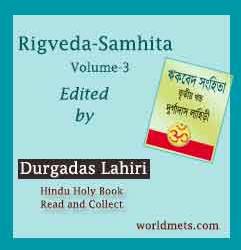
200 KB each including Taittiriya-Upanishad (Chapters 7-9) and Mahanarayana-Upanishad (Chapter 10). Shankara's commentary has influenced much of the subsequent interpretation of the meaning of the Taittiriya Upanishad. Each of these examples is called a, Sixth Anuvaka tells that in the space inside the heart there exists an immortal golden being (, The Seventh Anuvaka describes a meditation called, Eighth Anuvaka states the greatness of Holy Syllable, Ninth Anuvaka explains a pious way of life to be led by persons aspiring realization of, Eleventh Anuvaka is a set of instructions that teacher(Acharya) gives to his disciple after completion of vedic education. This part of the verse lead some scholars think that there was a difference of opinions on way of life leading to divine knowledge/realization at time of composition of this Upanishad. See what's new with book lending at the Internet Archive. Section Script Commentary Audio Seekshavalli English: Sanskrit: Tamil: Telugu: Dravida Bhashya. The Taittiriya Upanishad belongs to the Taittiriya school of the Yajurveda and hence the name. The Taittiriya Upanishad describes the various degrees of happiness enjoyed by the different beings in creation. Out of the ten chapters, seventh, eighth and ninth chapters are called as Taittiriya Upanishad and tenth chapter is called as Mahanarayana Upanishad. World Heritage Encyclopedia™ is a registered trademark of the World Public Library Association, a non-profit organization. The Taittiriya Upanishad is a Sanskrit text.

#SHIKSHAVALLI TAITTIRIYA UPANISHAD PDF PDF#
upanishads in tamil ebookupanishads pdf in tamil. It belongs to the Taittiriya recension of the Yajurveda and is constituted by the seventh, eighth and ninth chapters of Taittiriya Aranyaka. It is divided into three chapters and 32 sections, of which the first chapter, Sikhshavalli, containing 13 sections deals with siksha or the study of phonetics or pronunciation, which is an important branch of the Vedic studies.
#SHIKSHAVALLI TAITTIRIYA UPANISHAD PDF DOWNLOAD#
The reference codes indicated are TS - Taittiriya Samhita TB - Taittiriya Braahamanam TA - Taittiriya Aranyakam EAK - Ekaagni Kaandam RV - … download 1 file. Ninth Anuvak describes that knower of Brahman doesn't repent for not having done any good because for him/her, the terms good and bad loses their meaning and he/she has equalled them with Brahman since it is the only one which is really existing. Commentary by Swami Chinmayananda $10.00 excluding shipping. They form the Jnana-Kanda or the portions concerning the knowledge/wisdom of the ultimate principle referred as Brahman. Taittiriya Upanishad in PDF format Taittiriya Upanishad in PDF format. May He protect us both together may He nourish us both together May we work conjointly with great energy, May our study be vigorous and effective May we not mutually dispute (or may we not hate any).

Tell truth always, observe Dharma or (eternal divine laws), continue progeny, never leave truth, never leave Dharma, never abandon care of your health, never abstain from good rituals ordained in scriptures, never leave study/learning and teaching, never abandon worshipping gods (Deva's) and revering ancestors (Pitru's). May Varuna be propitious unto us! Taittiriya Upanishad Part One On Siksha or Pronunciation Chapter I-Invocation Harih Om. Funding for USA.gov and content contributors is made possible from the U.S. It is considered likely that texts such as the Upanishads were composed by groups of pandits and then amended over time. It is one of the older, "primary" Upanishads commented upon by Shankara.

The statement "Brahmavida Apnoti Param" which means "The one who knows Brahman attains supreme state" is the formula (Sutra-Vaakya) to get the high level gist of this Valli. The tenth chapter of the same Aranyaka is the Mahanarayana Upanishad. In Sixth and Seventh Anuvaks, some of the questions asked by a disciple are answered. The Taittiriya Upanishad is divided into three sections or vallis, the Siksha Valli, the Brahmananda Valli and the Bhrigu Valli.

Contains three parts: Siksa Valli, Brahmananda Valli & Brghu Valli.


 0 kommentar(er)
0 kommentar(er)
